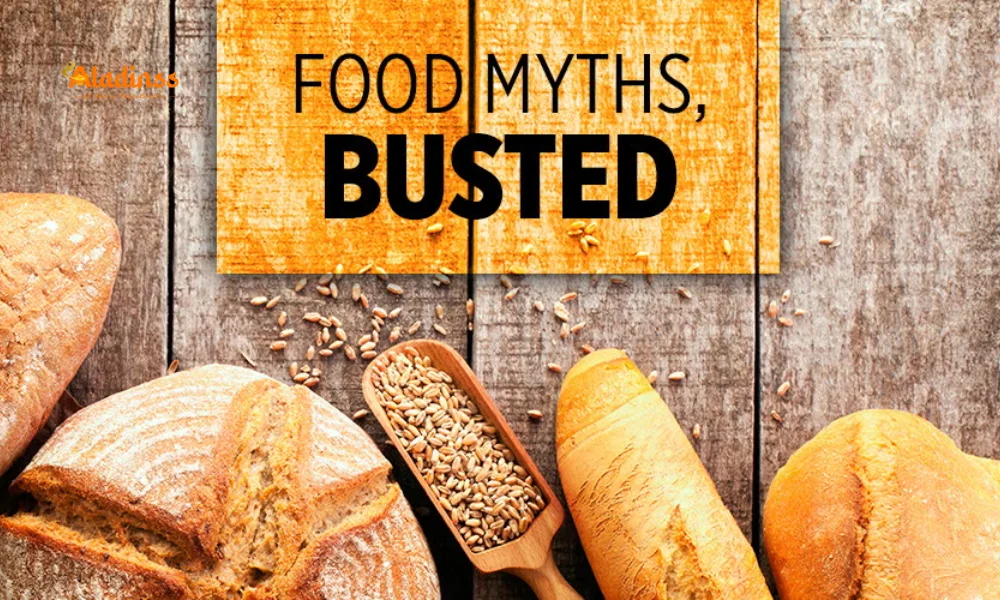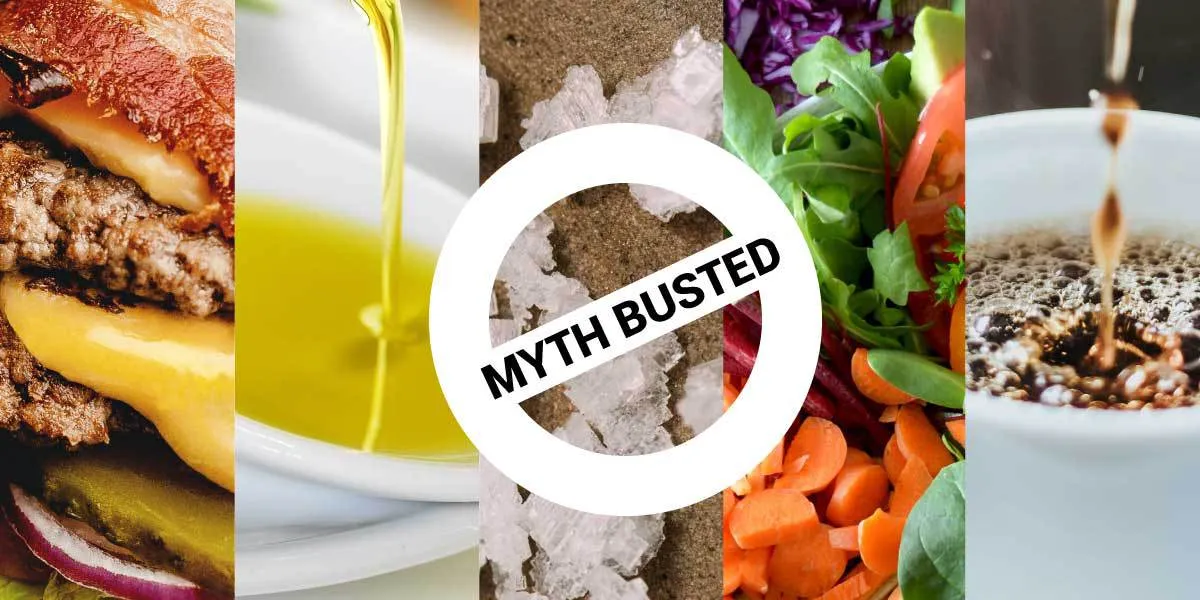Food Myths Busted: Separating Fact from Fiction This World Food Day

Food Myths Busted: Separating Fact from Fiction This World Food Day
In India, food wisdom is often passed down through generations, but not all of it holds up under scrutiny. From avoiding egg yolks to fearing late-night meals, many food myths persist, shaping our dietary choices. This World Food Day, celebrated annually on October 16, we debunk common food misconceptions with science-backed insights. By clearing the fog around these myths, we aim to empower Indian consumers to make informed, healthy choices. Let’s dive into six prevalent food myths, explore their origins, and uncover the truth to help you plan a balanced diet without the clutter of outdated beliefs.

Myth 1: Egg Yolks Are Bad for Your Heart
Egg yolks have long been demonized in India, where eggs are a staple in dishes like anda bhurji and omelets. With 186 mg of cholesterol per yolk, many believe they harm heart health. However, recent research flips this narrative. Dietary cholesterol, found in animal-based foods like eggs, poultry, and dairy, has minimal impact on blood cholesterol levels for most people. The real culprits are trans fats and excessive saturated fats in processed foods like samosas, pakoras, and packaged snacks.
Whole eggs are a nutritional powerhouse, offering protein, healthy fats, and essential nutrients like choline, vitamin D, and B vitamins. In India, where affordable protein sources are vital, eggs priced at ₹60-₹80 per dozen are a budget-friendly option. Enjoy them boiled, scrambled, or in curries without guilt. The key is moderation—1-2 eggs daily fit well into a balanced diet for most healthy individuals. Always consult a nutritionist if you have specific health concerns.
Myth 2: Eating Late at Night Causes Weight Gain
A common belief in Indian households is that eating after 8 PM leads to weight gain. Late-night biryani or paratha sessions are often blamed for expanding waistlines. However, science suggests it’s not the timing but the total calorie intake and activity level that matter. Late-night eating often coincides with inactivity, like binge-watching or lounging, which can lead to unused calories being stored as fat.
For Indians with busy schedules, late dinners are sometimes unavoidable. The solution is to focus on portion control and nutrient-dense foods. Opt for lighter meals like dal, roti, and sabzi instead of heavy, oily dishes. Pairing dinner with a short walk can aid digestion and prevent weight gain. By prioritizing balanced meals over rigid meal timing, you can enjoy your food without worrying about the clock.
Myth 3: Low-Fat Foods Are Always Healthier
Low-fat foods, from biscuits to dairy products, are marketed as healthy choices in India. However, removing fat often strips away flavor, leading manufacturers to add sugar, salt, or artificial flavor enhancers to compensate. For instance, low-fat yogurt or snacks may contain high sugar content, which can spike blood sugar and contribute to weight gain. In Indian markets, where packaged foods are popular, a pack of low-fat biscuits (₹30-₹50) might seem healthy but could be loaded with hidden sugars.
Be a savvy consumer by reading nutrition labels carefully. Look for added sugars, sodium levels, and artificial additives. Instead of low-fat processed foods, opt for natural sources of healthy fats like nuts (₹200-₹400 per kg), avocados (₹100-₹150 per kg), or ghee (₹500-₹800 per liter) in moderation. These provide sustained energy and essential nutrients without the rollercoaster of energy spikes and crashes caused by high-sugar alternatives.
Myth 4: Microwaves Destroy Nutrients in Food
Many Indian households rely on microwaves to reheat rotis, curries, or leftovers, yet some believe this method strips food of nutrients. The truth is that nutrient loss depends on cooking time and temperature, not the device. Microwaves cook food quickly, often preserving more nutrients than prolonged boiling or frying. For example, steaming vegetables in a microwave for 2-3 minutes retains more vitamins than boiling them for 10 minutes.
To maximize nutrient retention, use microwave-safe containers, cover food to trap steam, and avoid overcooking. In India, where quick meal prep is essential for busy families, microwaves priced at ₹5,000-₹10,000 are a practical tool. Pair microwave cooking with fresh ingredients like spinach (₹30-₹50 per bunch) or carrots (₹50-₹80 per kg) to ensure a nutrient-rich meal without breaking the bank.
Myth 5: Brown Bread Is Healthier Than White Bread
In India, brown and multigrain bread are often perceived as healthier than white bread. However, most commercial brown bread is made from refined flour (maida), just like white bread, with caramel coloring and a few seeds added for appearance. These breads lack the fiber, vitamins, and minerals found in true whole-grain options. A loaf of commercial brown bread (₹40-₹60) offers little nutritional advantage over white bread.
For a healthier choice, look for bread labeled “100% whole wheat” or “whole grain” on the packaging. These retain the bran and germ, providing fiber, B vitamins, and minerals. Whole wheat bread, priced at ₹50-₹80 per loaf, supports digestion and sustained energy. Pair it with homemade spreads like peanut butter (₹150-₹300 per 500g) for a nutritious breakfast or snack that aligns with Indian tastes.
Myth 6: You Can Eat Anything If You Work Out
Many Indians believe that regular exercise, like gym workouts or yoga, gives a free pass to eat anything, from mithai to chips. While exercise burns calories, it doesn’t negate the effects of a poor diet. Empty-calorie foods like cakes (₹300-₹500 per kg), chips (₹20-₹50 per packet), and aerated drinks (₹40-₹80 per liter) provide little nutrition and can lead to weight gain, even with workouts.
A balanced diet complements exercise for optimal results. Focus on whole foods like lentils (₹100-₹150 per kg), vegetables, and lean proteins. Occasional indulgences, like a piece of gulab jamun (₹10-₹20 each), are fine, but consistent healthy eating is key. For Indian fitness enthusiasts, pairing workouts with nutrient-dense meals like quinoa salad or dal-rice ensures better energy and recovery.
Why Food Myths Persist in India
Food myths often stem from cultural traditions, incomplete information, or outdated science. In India, where food is central to family and community life, advice from elders is deeply respected. However, as dietary patterns evolve with urbanization and processed foods become more common, it’s crucial to question long-held beliefs. Misconceptions like avoiding egg yolks or fearing microwaves can limit access to affordable, nutritious options in a country where food prices are a concern for many.
For instance, eggs and whole wheat bread are cost-effective at ₹60-₹80 per dozen and ₹50-₹80 per loaf, respectively, making them accessible for middle-class families. By debunking myths, we can embrace these foods without fear. Education and awareness, especially on World Food Day, empower consumers to make choices that align with modern nutritional science.
How to Make Smarter Food Choices
Navigating food choices in India’s bustling markets can be overwhelming, but a few strategies can help. Always read nutrition labels on packaged foods, checking for added sugars, sodium, and artificial additives. Prioritize whole foods like fruits (₹50-₹120 per kg), vegetables, and pulses, which are affordable and nutrient-dense. When shopping for bread or dairy, opt for whole-grain or minimally processed options to maximize health benefits.
Meal planning is another practical approach. Prepare balanced meals with a mix of protein, fiber, and healthy fats to avoid reliance on processed snacks. For example, a lunch of dal (₹100-₹150 per kg), brown rice (₹80-₹120 per kg), and a vegetable sabzi costs less than ₹50 per serving and supports long-term health. Consulting a nutritionist can further personalize your diet, ensuring it meets your specific needs.
Embracing Science-Backed Nutrition
World Food Day is a reminder to rethink our relationship with food. By busting myths, we can make informed choices that align with our health goals and budgets. In India, where diverse cuisines and economic realities shape eating habits, separating fact from fiction is key. Whether it’s enjoying whole eggs or reheating leftovers in a microwave, small changes can lead to big health benefits without breaking the bank.
As India’s food landscape evolves, staying informed is crucial. Focus on whole, minimally processed foods, and don’t shy away from affordable staples like eggs, lentils, and vegetables. With prices like ₹30-₹60 per kg for vegetables and ₹100-₹150 for pulses, healthy eating is within reach. Let’s celebrate World Food Day by embracing science-backed nutrition and making smarter food choices for a healthier future.
Comment / Reply From
No comments yet. Be the first to comment!






